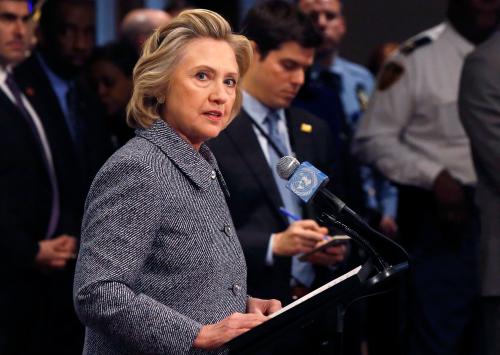Editors’ Note: The partiality of our consciences, our inability to care about all who have a proper claim upon our care, is not the result of a constraint upon our budgets, writes Leon Wieseltier, or more generally upon our institutions of politics and government. It is the result of a constraint upon our imaginations. This piece originally appeared in
The
Washington Post
.
On a sleepless night last winter—insomnia being an intelligent response to the condition of our country—I turned on the television and found “The Deer Hunter.” As I watched the extraordinary first hour of the film—the steel mill and its fiery floor; the homely tavern with its clinking beer bottles and its crooning jukebox; the VFW hall festooned for a wedding with a banner that proclaimed “serving God and country”; the Russian Orthodox church, its onion domes reaching stubbornly for the heavens past a bleak industrial sky; the hunting party in the Allegheny Mountains, in which a crude, even revolting masculinity somehow collides with the sublime—the elegiac tale suddenly acquired a sharp political point. The film is the great cinematic poem to the world of what we have come to call, as a consequence of the current presidential campaign, “the white working class.” “The whole thing,” Christopher Walken says lovingly about his Pennsylvania town on the night before he and his friends are to deploy to Vietnam. “It’s right here.”
We are inconstant in our decency, which is perhaps the most common form of indecency.
Not anymore, of course. The world of these people, “the whole thing,” has been shattered and lost. The economic foundations of their way of life were destroyed by the unforgiving logic of globalization, and then by the recession and its scandalously uneven recovery. The blandishments of the digital economy passed them by. Their current rates of alcoholism, life expectancy and suicide are now notorious. But only a little while ago, those measures of human breakdown and social collapse were not widely known. Since much of the white working class lives in states with large rewards in electoral votes, it had been the national custom to pause and remark upon their misery only every four years; and in the years between general elections, when the course of American history, or rather the interest of American politicians, did not run through Ohio and Pennsylvania, they had generally been met with indifference and even contempt. And the same was the case with other unshiny regions in our country of wildly varying destinies. Republicans have been indifferent to them because Republicans revere winners and they are losers. Democrats have been indifferent to them because they are culturally embarrassing (and because many Democrats, too, have had little time for losers). Now they finally command the attention of the country—they have been discovered—which is itself a victory for fairness in America; but a large portion of them have gained this recognition by debasing American politics with a desperate preference for a strongman. It is one of the lowest ironies of this low time.
As I watched “The Deer Hunter,” I was struck by the scattershot nature of American compassion. There are many groups in our society that suffer hardship and discrimination, but we confer moral glamour on some of them and not on others. We are never concerned in equal measure about them all. We are inconstant in our decency, which is perhaps the most common form of indecency. The media has made our attention, and therefore our mercies, fickle; from our digital sources we know about all sorts of suffering, and we just live with the knowledge. But our passing sympathies, the soft betrayals of the intermittent heart, are not exactly random. When, for example, politicians and political consultants decided that their fate would be decided by the American middle class, the American poor more or less vanished from our political discourse. More recently, odious events have forced many Americans to acknowledge the selectivity of our solidarity — a year of lives suddenly mattering. The shatteringly long list of young black men killed by police, and the obscenity in the Emanuel African Methodist Episcopal Church in Charleston, S.C., rattled even the most devout believer in the progress that has been made in American civil rights and complicated American pride with American shame. The sense of achievement in this struggle has been harshly qualified by the sense that this struggle will be unceasing. And then the eruption of populism in the primaries turned the spotlight on the “Deer Hunter” electorate: The campaign of Bernie Sanders, before his success transformed him into a sanctimonious messiah, established the moral urgency and the political salience of the issue of economic inequality, while the campaign of Donald Trump, always and forever an authoritarian boor, exploited the issue without knowing how to do anything about it. And so the white working class is trending.
The partiality of our consciences, our inability to care about all who have a proper claim upon our care, is not the result of a constraint upon our budgets, or more generally upon our institutions of politics and government. It is the result of a constraint upon our imaginations.
The partiality of our consciences, our inability to care about all who have a proper claim upon our care, is not the result of a constraint upon our budgets, or more generally upon our institutions of politics and government. It is the result of a constraint upon our imaginations. Ethical principles are most commonly ascribed to the operations of reason, but we need to remind ourselves of the role of the imagination in moral action. Without the imagination, we would act only against wrongs that we ourselves have endured. We would be prisoners of our experience—which is to say, the experience of people less lucky than ourselves would be incomprehensible to us. To be sure, it would be presumptuous to believe that we fully understand the agonies of people who have suffered war and famine and pandemic and extreme poverty and slavery and genocide, when we, or most of us, have suffered nothing of the sort. But it would be callous, and a dereliction of our human duty, to believe that their agonies are completely beyond our comprehension, closed off to us, so that fellow-feeling is not possible and acts of assistance and rescue are not obligated.
What brings fellow-feeling into being is the imagination. We identify with pain by picturing it. At the beginning of “The Theory of Moral Sentiments,” Adam Smith lucidly made the point: “Though our brother is upon the rack, as long as we ourselves are at our ease, our senses will never inform us of what he suffers. They never did, and never can, carry us beyond our own person, and it is by the imagination only that we can form any conception of what are his sensations. . . . By the imagination we place ourselves in his situation, we conceive ourselves enduring all the same torments, we enter as it were into his body, and become in some measure the same person with him.” Solidarity is created by that “as it were” and “in some measure”: The approximations of the imagination, respectful of the interiority of experience but impatient with it, are powerful enough to establish a commonality between otherwise unshared lives, and thereby the grounds of a moral understanding. Sympathy, as Smith observed, is produced “by changing places in fancy with the sufferer.”
If this is so, then the old dichotomy between art and ethics, between the beautiful and the good, is not all we need to know about the place of art in life. Art, high and low, may play an indispensable role in the formation of virtue. One of the ways in which it does so is by picturing pain. Its pictures of pain may confer pleasure, but they also confer enlightenment about human fates unfamiliar to us; and it is not the case that the aesthetic satisfaction that we feel at the quality of a representation of evil destroys its moral meanings. Novels and poems and paintings and films and songs may bring the news of distant or hidden sufferings and abuses. By creating sympathy, art lays the ground, the internal condition, for moral behavior. This does not mean that art must be, for moral reasons, didactic or pledged to a politics—though such art, tendentious art, bad art, may be socially and politically quickening, as dictators and their propagandists have long known. It was “The Deer Hunter,” and not CNN, that most vividly illuminated for me the sources of the volatility and the fury that are mutilating contemporary politics.
The imagination of other people’s pain extends the self beyond its own sensations, as Smith said, and also beyond the confines of its assumptions and its surroundings; and this inner expansion, this mental and spiritual preparation, is what transforms justice from a fantasy into a cause. All this is very uplifting. But it is hardly the whole story. The white working class differs in a significant way from the people who have discovered it. Our moment does not consist only in millions of Americans stepping outside themselves and proclaiming their sympathy for others. It consists also of millions of Americans staying inside themselves and proclaiming their sympathy for themselves. And just as the emphasis on other people’s tribulations expands us, the emphasis on our own tribulations contracts us.
[J]ust as the emphasis on other people’s tribulations expands us, the emphasis on our own tribulations contracts us.
We are all hobbled by the narrowness of inherited circumstances. In our bodies, in our communities, in our social classes, we are all provincials, all in need of correction and amplification by the encounter with other views and practices of life. In situations of adversity, moreover, our partiality becomes even greater. In hardship we discover, though we may not recognize it, the parochialism of pain. Pain is all that pain knows, its knowledge is supremely local, and it is for this reason an inadequate position from which to grasp the world. Pain is only another perspective. There are those who now think otherwise and regard the subjectivity of pain—the experience of social discrimination and marginalization, usually by race and gender—as a kind of ultimate authority in the analysis of society. They have invented a field called “standpoint theory,” according to which the social location of oppressed individuals enables them to see more and to know more, rather in the way that Marx believed in the epistemological superiority of the proletariat. There is some merit to the old idea that there are things that can be seen from the periphery that cannot be seen from the center, and privilege is certainly no guarantee of wisdom, but it is important also to remember that suffering does not confer infallibility, or even objectivity. Even victims, or especially victims, can become prisoners of their experience. They, too, can make mistakes—sometimes disastrous ones. Pain has no special access to truth. Reality cannot be correctly understood from the standpoint of a personal injury, individually or collectively.
[W]e seem to be living in a country of personal injuries. In our political season this takes the form of a politics of grievance.
Yet we seem to be living in a country of personal injuries. In our political season this takes the form of a politics of grievance. The prestige of anger in our politics has grown disproportionately to anger’s justifications and exceeded them, so that voting appears to have become more an explosion of feeling than an expression of thought. (It is the voters, after all, to whom demagogues owe their ascendancy. The wisdom of crowds!) Valid grievances have turned poisonous and welcomed intolerance and untruth into their orbit. Outrage, a fine political emotion, has degenerated into resentment and hatred. A shocking number of Americans seem more conspiratorial than deliberative. The responsibilities of policy are overwhelmed in our debates by the wounds of collective memory, recent and ancient. All this does not signify the end of democracy, and democracy is not to be blamed for it. Democracy requires of us that we live by our nerves. But it also requires of us that we keep our heads; and if reason and respect are democratic qualities, then there is a decidedly undemocratic spirit loose in the land. We are punishing our politics with our pain, when the solutions for our pain may be found only in our politics.
The explanatory power of pain is the central conceit, and the central error, of Ta-Nehisi Coates’s “Between the World and Me,” a book that was immediately recognized as a significant document of our day. It is a work of profound feeling, whose sonorities of grief and bitterness are hard to forget. “To be black in the Baltimore of my youth was to be naked before the elements of the world, before all the guns, fists, knives, crack, rape, and disease”: This is eloquence that is empirical. Coates’s memoir is animated by a deep and lacerating horror of the injustices that disfigure the everyday experience of African Americans in our cities, which include the murder of his friend by the Baltimore police. But its light is not the equal of its heat. The clarity that he displays about his own story, about his own torments and his own ideals, does not lead him to a commensurate clarity about the larger world in which he lives, about America. In the intensity of his indignation, instead, Coates caricatures it: “I have seen [the American Dream] all my life. It is perfect houses with nice lawns. It is Memorial Day cookouts, block associations, and driveways. The Dream is treehouses and the Cub Scouts. The Dream smells like peppermint but tastes like strawberry shortcake.” This, America now? It is not even white America anymore, where strawberry shortcake has turned for many into wormwood.
“I am convinced,” Coates declares, obscurely but ominously, “that the Dreamers, at least the Dreamers of today, would rather live white than free.” And more: “ ‘White America’ is a syndicate arrayed to protect its exclusive power to control our bodies.” And still more about “the Dreamers,” or “the majoritarian bandits of America,” who must be roused “to the facts of what their need to be white, to talk like they are white, to think that they are white, which is to think that they are beyond the design flaws of humanity, has done to the world.” This is ugly and coarse. Coates’s book is just a revival of the old Malcolmist wrath, whose lyricism disguises its futility. Pessimism always feels like realism. But the actually existing America in which racism stubbornly persists is also a country that is becoming increasingly “minority majority”; a country in which many whites are “underwater”; a country where Muslims and Mexicans are rightly anxious about what lies ahead; a country which feels to increasing numbers of its citizens like a republic of disadvantages. And a country whose methods of politics and government might still address all these failures, if only we could get to the other side of anger.
People in adversity turn not to economics but to culture. They are fortified not by policy but by identity. They seek saviors, not programs.
Grievance is sometimes the author of blindness, or worse. All the way at the other end of the political spectrum from the black aggrieved are the white aggrieved, and they are the ones playing with a terrifying fire. The people who support the white working class have been voting for Bernie Sanders, but the white working class has been voting for Donald Trump. He would be nowhere, and we would not be facing a grave historical crisis, without the enthusiasm of these despairing and deluded millions. It was inevitable that we would not escape the political consequences of our economic dislocations, but those consequences now include the darkest forces of reaction. These downtrodden demand sympathy, and they deserve sympathy, but they do not give sympathy. They kindle, in the myopia of their pain, to racism and nativism and xenophobia and misogyny and homophobia and anti-Semitism. They swoon over an ignorant thug who promises to deport 11 million immigrants from a country built by immigration and to close the borders of a religiously free country to an entire religion.
What does economic wretchedness have to do with the appetite for authoritarianism? There is nothing very mysterious here. Liberals and socialists have been wondering for a hundred years why people in economic distress do not vote according to their economic interests. The answer should have been obvious long ago: People in adversity turn not to economics but to culture. They are fortified not by policy but by identity. They seek saviors, not programs. And as the direness of their circumstances appears to imperil their identity, they affirm it by asserting it ferociously against others. Hurt people hurt people. Against these hurt people, therefore, and against the profiteer of pain who shabbily champions them, it must be insisted that no amount of sympathy for their plight justifies the introduction of a version of fascism into American life. No grievance, however true, warrants the fouling of American politics by the bigotry and the brutishness peddled by Donald Trump. Either he wins or America does.






Commentary
How voters’ personal suffering overtook reason—and brought us Donald Trump
June 25, 2016